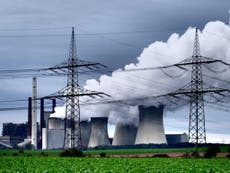The race to stabilise the Earth’s climate was always going to be long, slow one.
So slow and so difficult that there will always be a temptation to think that it is all too complicated, that immediate problems are more pressing or that China, the United States and multinational corporations will never agree to the radical changes needed. Perhaps we should just give up and resign ourselves to trying to adapt as best we can to climate change once it starts to get serious.
That is the sort of fatalism that lies behind the backlash against the environmental ambitions set out by the Government in its early days. David Cameron seemed sincere in his determination to lead a greener Conservative Party when he became Prime Minister but he has been on the defensive since. From the “greenest government ever” to George Osborne’s “slowest ship in the convoy” moment – his promise that Britain would cut carbon emissions “no slower but also no faster” than other EU countries – the Conservatives now seem to be in headlong retreat.
As we reported last week, Eric Pickles, the Local Government Secretary, has blocked 19 planning applications for onshore wind farms in the past year, prompting Ed Davey, the Liberal Democrat Energy and Climate Change Secretary, to warn him against “abusing ministerial power”. Mr Pickles has gone against not just the Government’s green promises but also its promise to liberalise planning law and its promise to respect local decision-making, which in many of these cases was in favour of wind farms.
By chance, wind generation briefly provided 20 per cent of the UK’s electricity at one point last week. Which is one answer to the kind of fatalism that says it would all be too difficult to make the changes needed to move to a low-carbon economy.
Another answer is provided by our report today of the breakthrough brokered by the United Nations. After years of opposition, hundreds of the world’s largest companies have signed up to the UN’s Global Compact, which accepts the “polluter pays” principle of putting a price on the environmental costs of burning carbon fuels.
This follows the Chinese government’s decision to bring in carbon pricing next year. Together, the two developments mean that the geopolitics of climate change have been transformed. Several governments remain outside the growing global consensus in favour of carbon pricing – the US and Australia chief among them – but this can no longer be dismissed as the obsession of a few rich western European nations.
The Independent on Sunday has long argued that raising the price of carbon-based energy is the best way to both curtail the output of greenhouse gases and harness the power of market forces to do it efficiently. We accept this needs international agreement because Britain, or the European Union, can only get a certain distance ahead of the pack. There is a balance to be struck between leadership and imposing costs on ourselves that are not borne by others.
But China’s new policy and the “major shift in corporate mindset” hailed by Ban Ki-moon, the UN Secretary General, have advanced the global consensus.
The fatalism expressed by Owen Paterson, the former environment secretary, in a speech in which he confirmed he had been opposed to the Government’s climate-change policy all along, is now out of date. He claims decarbonising UK electricity generation would be too expensive and for no good purpose while developing countries are increasing their carbon dioxide output.
However, world opinion is changing and it is time to cast off fatalism and get on with the task of strengthening the global consensus on climate change with a new optimism.


Join our commenting forum
Join thought-provoking conversations, follow other Independent readers and see their replies